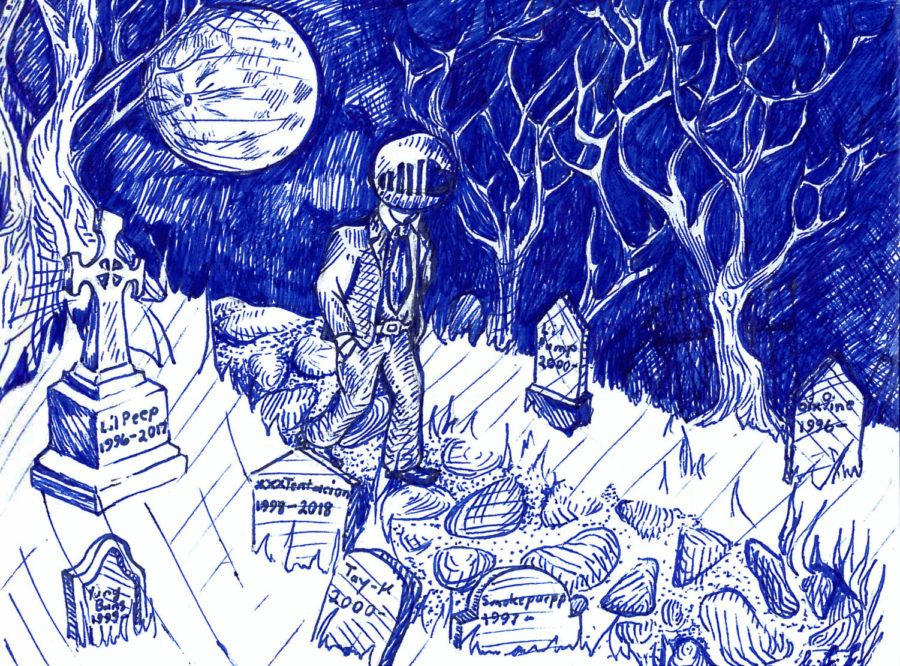SoundCloud rappers mumble rap: are we missing the moral message?
More stories from Emmanuelle Copeland
With how quickly these rappers fall, whose up next?
Described by New York Times author Jon Caramanica as “the most vital and disruptive new movement in hip-hop thanks to rebellious music, volcanic energy and occasional acts of malevolence,” SoundCloud rap continues to take on the mainstream. But as SoundCloud rappers rack up viral hits and make bank, one might as well analyze what their raps’ are really worth. So here’s my response to nearly every Lil [Insert Random Word Here] out there.
There is some merit to SoundCloud rappers. For most, it’s the basic underdog kind of story. The idea of “lo-fi”, intentionally low sound quality, allows for more accessibility to music, which is almost always a positive way for youth to self-express.
But the controversy of SoundCloud rappers comes in the idea of influences, both in what they are influenced by and what impact they actually can have.
Because the sociopolitical issues discussed in their songs tend to be problems that persist across generations, hip-hop has always used samples and throwbacks. This was once the case with the case in the classics of Mos Def’s “Modern Marvels” sampling Marvin Gaye’s music or Public Enemy’s “Can’t Truss It” sampling voice samples of Alex Haley and Malcolm X.
But many SoundCloud rappers will proudly profess their separation from older generations of rap. Lil Xan’s been under fire in the past for calling Tupac boring. Lil Yachty’s made some controversial statements about being indifferent to the Notorious B.I.G. And this is kind of wild for them to do but is also a given when many of their lyrics lack complexity.
A staple characteristic in SoundCloud rap is “mumble rap,” which is essentially just a lack of clear articulation of words. But the definition is also sometimes extended to raps in which the lyrics simply don’t matter that much which seems counterintuitive in a genre that is essentially built on words.
It’s not that SoundCloud rappers lack messages. It’s just that they lack substance. The cornerstone to many of these rappers is the idea of emo rap. This acts in an almost antithesis to many older rappers that speak to immortality and power. Emo rap stresses mortality and talks very candidly about drugs and violence in a way that feels relatable yet taboo for many teens. But they don’t necessarily offer any incite to these topics. They simply talk about living without a care and fast. Then Lil Xan tells you not to do drugs 10 times over as if simply saying it enough times makes a more convincing message. Because a lot of these rappers can’t elaborate on many thoughts before switching to talking about partying or women or simply dying.
But the thing about that is so many of them live so rashly. It’s not a coincidence in how many of them are lost to drugs or violent internal affairs during the short duration in which they’ve had popularity. To some extent it is a problem of the society that promotes them.
In a statement to the Senate Hearing on Lyrics & Labeling, the National Campaign for Freedom of Expression wrote, “Discussions about direct correlation between media messages and actual acts of violence distract us from getting at the real causes of mediated violence […] The discussion distracts us from the real causes of crime: things like child abuse, poverty, parental neglect in care and time spent with their child.”
Often times debates about these rappers do tend to distract us from the actual issues that they mention because we attack the artist before we look at the state of the communities that they influence or come from.
Believe it or not “This is America” by Childish Gambino, a non-SoundCloud rapper, is not just a catchy song with a controversial topic of gun violence and African Americans, but also a larger critique on media. Essentially stating that we tend to ignore larger issues by distracting ourselves with catchy songs and our following of whatever gets viral. That essentially is the problem of popular SoundCloud rappers.
Many of them are young boys who have serious problems and are enabled to feed into the worst aspects of society because many want to see them fail as a kinda cruel form of entertainment.
As said in 1985 by J.Cole, “They wanna see you dab, they wanna see you pop a pill. They wanna see you tatted from your face to your heels.”
SoundCloud rappers aren’t deep in their self-depreciation, but rather tend to write self-fulfilling prophecies for themselves and their followers about expectations on race, drugs, and other issues that need more attention and to not be trivialized in trending songs.



Maddie • Dec 11, 2018 at 10:07 am
I found your article on Best of Sno, and it was very well written. Good points and analysis on an often overlooked topic.